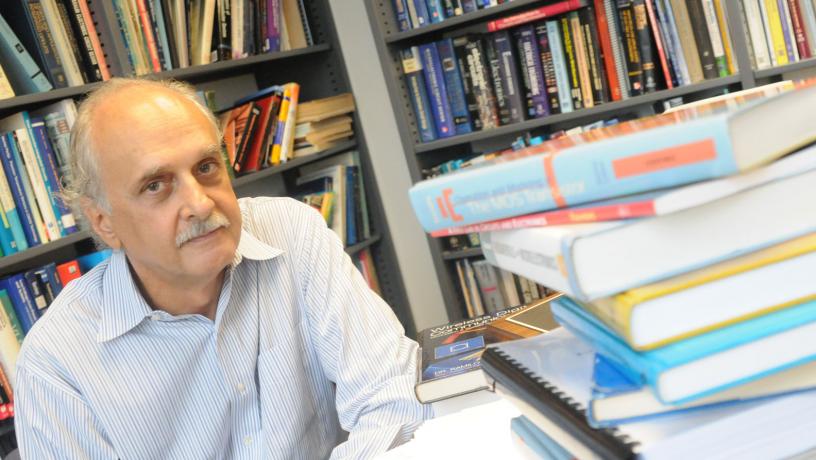Prof. Yannis Tsividis Elected to the National Academy of Engineering

Yannis Tsividis was honored for his contributions to analog and mixed-signal integrated circuit technology and engineering education.
Yannis Tsividis has been elected a member of the National Academy of Engineering (NAE), one of the highest professional honors awarded to an engineer. The NAE cited his “contributions to analog and mixed-signal integrated circuit technology and engineering education.”
“I am deeply honored to join such a distinguished group,” says Tsividis, who is the Edwin Howard Armstrong Professor of Electrical Engineering and at the forefront of advancing analog and mixed-signal integrated circuits, many of which are used in our modern-day electronics, from computers to mobile phones to systems-on-a-chip. “This recognition means a lot to me. I want to thank Columbia, and especially the School of Engineering and the Department of Electrical Engineering, for giving me the support and independence to do my research and teaching, and also thank my graduate students, without whom the results of our group would not have been possible.”
Tsividis’ research focuses on the synergistic co-existence of both analog and digital circuits working together on the same silicon chip, and on how these circuits interface with the physical, analog world. He and his students have worked at the device, circuit, system, and computer simulation levels, developing new techniques for analog and mixed-signal processing and coming up with novel circuit building blocks, self-correcting chips, mixed analog-digital single-chip computers, circuit theory, and techniques for semiconductor device modeling.
“Yannis Tsividis has been a pioneer in silicon chip interfaces,” says Columbia Engineering Dean Mary C. Boyce. “His creative approach has enabled this technology to develop in exciting new directions. Not only is he an innovative engineer, he is also an outstanding educator. We are so proud to have him as an integral member of our faculty.”
Peter Kinget, Bernard J. Lechner Professor of Electrical Engineering and department chair, added, “Yannis has made foundational contributions that helped establish the field of CMOS integrated analog and mixed-signal circuits, and that have fueled the explosive growth of modern electronics. He has also been a long-term driver behind educational and research excellence in our department, and we are very happy to see his contributions recognized by the Academy.”
Yannis Tsividis has been a pioneer in silicon chip interfaces. His creative approach has enabled this technology to develop in exciting new directions. We are so proud to have him as an integral member of our faculty.
In 1976, Tsividis demonstrated the first fully integrated MOS (metal oxide semiconductor) operational amplifier, along with its use in a coder-decoder for digital telephony, and proposed detailed design techniques for MOS analog circuits that were widely adopted and led to the first massively produced, mixed-signal integrated circuits. His group also developed the software program Switcap in 1981, which became an industry standard and was used in the design of hundreds of integrated circuits for telecommunications, biomedical electronics, and consumer electronics.
He co-invented several techniques in integrated analog filters that have been in very large volume production, notably as part of high-speed computer hard disc drives and other equipment. He has also been an early advocate of, and contributor to, timing-based circuits and signal processing. At the device level, benchmarks proposed by him and his group for testing advanced MOS device models have been widely used and have influenced the state of the art in MOS transistor modeling. His work has resulted in about 40 patents in several countries. His book, Operation and Modeling of the MOS Transistor, co-authored with Colin McAndrew and now in its third edition, has become a standard reference worldwide.
Tsividis’ current focus is on analog computing and hybrid computing on silicon chips, and on event-driven, continuous-time digital circuits, signal processing, and data acquisition, in which the time dimension is a critical part of signal representation. “It is time we really took advantage of time,” says Tsividis jokingly.
Tsividis, who grew up in Greece, received his BEE degree from the University of Minnesota, Minneapolis, and his MS and PhD degrees from the University of California, Berkeley. His many awards include the 2007 IEEE Gustav Robert Kirchhoff Award, given annually for an outstanding contribution to the fundamentals of any aspect of electronic circuits and systems that has a long-term significance or impact, and the 2010 IEEE Circuits and Systems Education Award. A Life Fellow of the IEEE, he was given Columbia University’s Presidential Award for Outstanding Teaching, The Great Teacher Award, in 2003, Columbia Engineering School Alumni Association’s Distinguished Faculty Teaching Award in 1998 and 2010, and the Society of Columbia Graduates’ Great Teacher Award in 1991.
Tsividis joins Dean Mary Boyce and many other Columbia Engineering colleagues who are NAE members; most recently elected were Professors Julia Hirschberg in 2017 (Computer Science), David Yao (Industrial Engineering and Operations Research) in 2015, Gordana Vunjak-Novakovic (Biomedical Engineering) in 2012, and Mihalis Yannakakis (Computer Science) in 2011.
